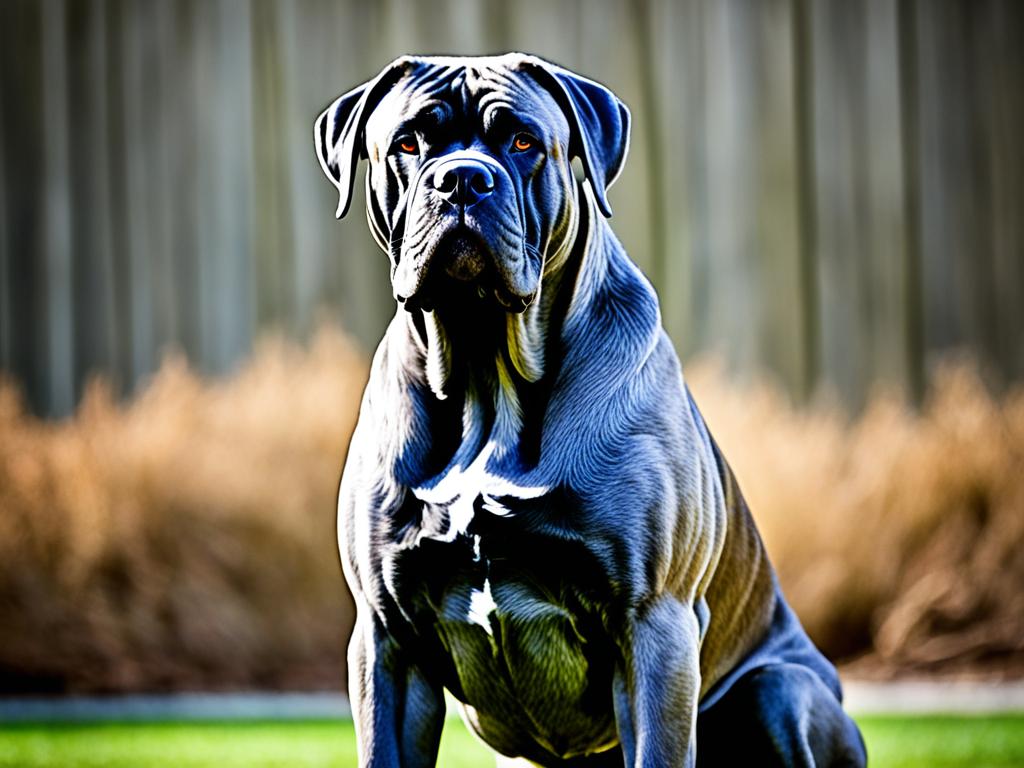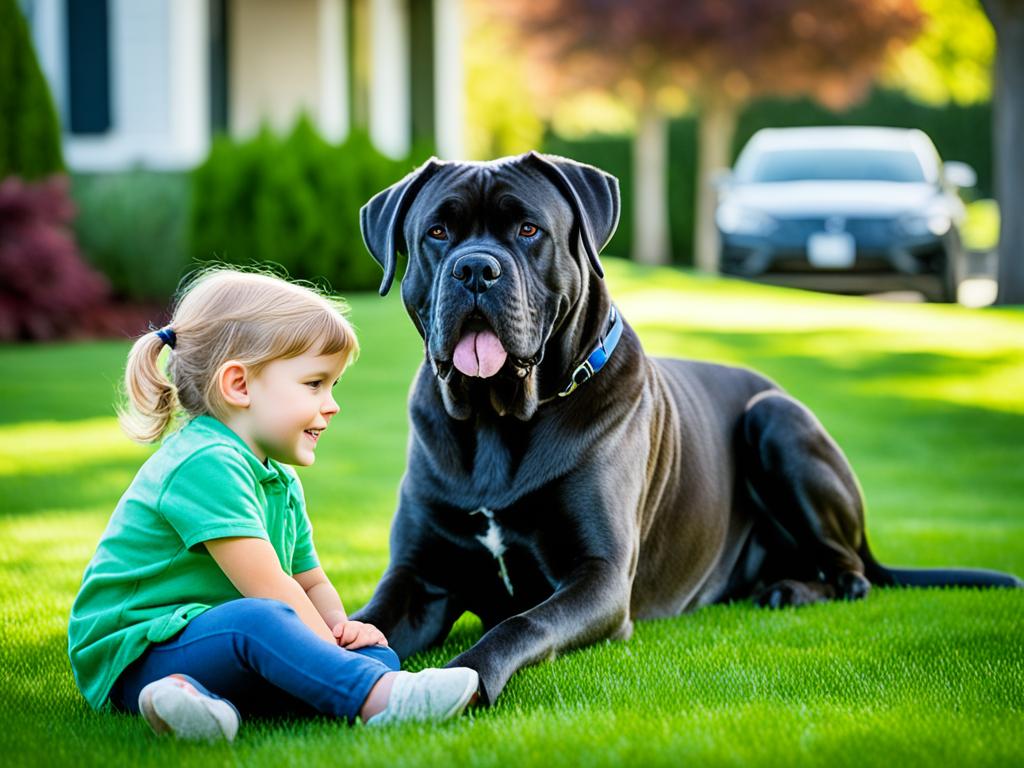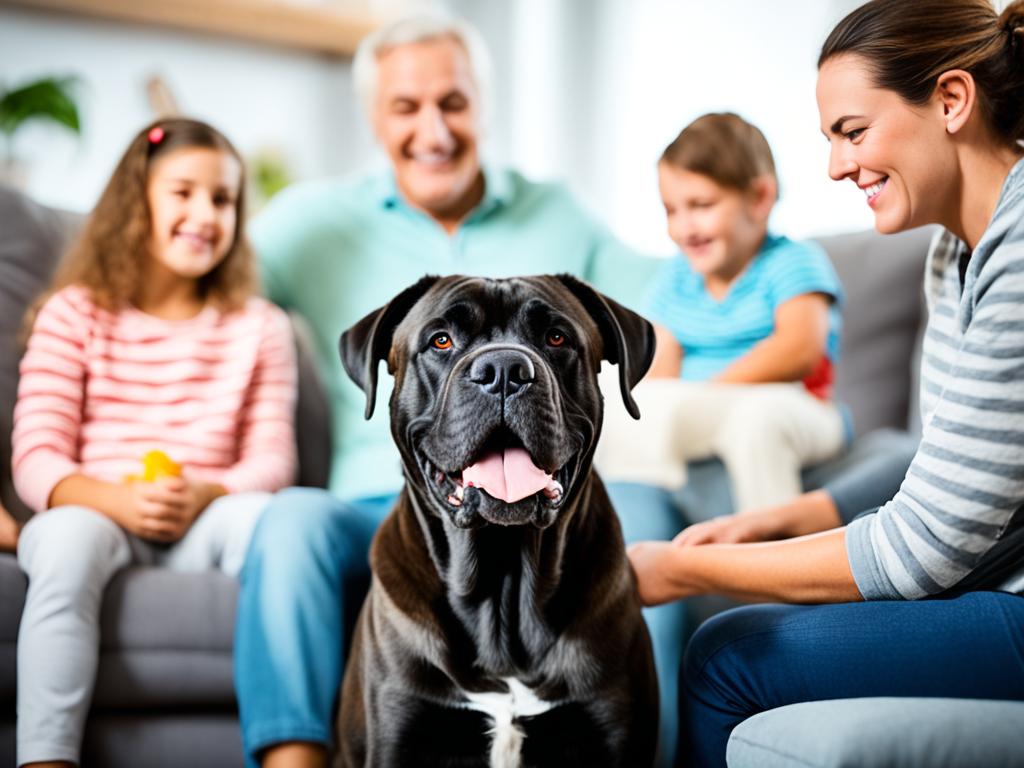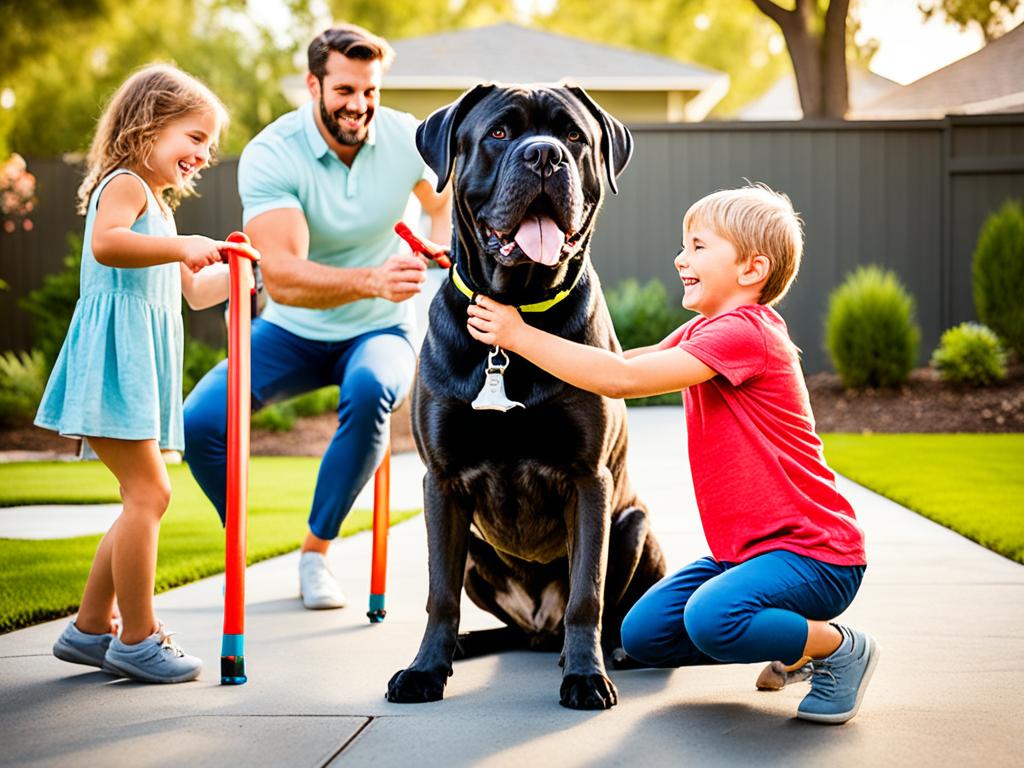In a nation of over 300 million people, it’s no small feat that the noble Cane Corso has experienced a surge in popularity, finding its place not just in the show ring but, perhaps more importantly, within the hearts of families across the United States. Known for their imposing presence, Cane Corsos can weigh beyond the 100-pound mark and stand tall with a confident demeanor. Yet, these titans of the canine world harbor a gentler side, revealing a temperament with family that’s as commendable as their storied lineage. The question is, does their family-friendly nature make a Cane Corso the right addition to your household?
Ancient guardians by heritage and affectionate companions by nature, the Cane Corso has evolved from a protector to a beloved family dog. What makes this breed so unique is its dual ability to be a loyal guardian and a gentle member of the family. If early socialization, exercise, and proper training are part of your family’s routine, a family-friendly Cane Corso might just be a perfect match, blending seamlessly into the fabric of your daily life and forging an unbreakable bond with each family member.
Key Takeaways
- Understanding the Cane Corso temperament with family is crucial in assessing their compatibility as a household pet.
- A well-trained and socialized Cane Corso can be an excellent family dog, combining loyalty with gentleness.
- Their protective instincts, paired with a loving disposition, enhance the Cane Corso family compatibility.
- Regular exercise and mental stimulation are key to maintaining a happy and healthy family-friendly Cane Corso.
- Recognizing the commitment to training and care needed ensures a successful integration of a Cane Corso into family dynamics.
- With their historical role as defenders and their adaptable nature, the Cane Corso can be both a guardian and a cherished companion.
Understanding the Origin and Role of the Cane Corso
The Cane Corso history is one steeped in antiquity, tracing its roots to the classical civilizations of Greece and Rome. This ancient guardian breed, whose very name signifies “guard dog of the courtyard” in Latin, has served humankind in multifaceted capacities. Fulfilling roles from loyal protectors to diligent farmhands, the breed has displayed versatility and allegiance throughout its extensive past. Yet, it was not impervious to the sands of time, as it teetered on the brink of extinction before breed enthusiasts championed its revival. Let’s delve into the rich tapestry that makes up the Cane Corso ancestry.
The History and Development of the Breed
Origins of the Cane Corso can be located within the annals of ancient civilization, where they were esteemed based on their prowess and utility. Their journey through history is highlighted by their adaptability and the critical roles they encompassed, which evolved beyond the confines of warfare and agriculture and into domestic life. As modernity beckoned, the dedication of passionate breeders in the mid to late 20th century sparked a renaissance for the breed.
Ancient Guardians Turned Loyal Companions
The transition from war to peace marked a new epoch for Cani Corsi as they found new purpose within the home. The United States saw the introduction of these noble canines in the 1980s, signaling a pivotal shift in their role that aligned with familial companionship. Their acceptance into the American Kennel Club in 2010 is but a testament to their successful integration and the completion of their transformation from ancient guardians to beloved family members.
The timeline below charters a brief yet insightful perspective into the evolution from their genesis to the present day:
| Period | Role/Function | Location |
|---|---|---|
| Ancient Times | Military Canines, Farm Aids | Greece, Rome |
| Mid-Late 20th Century | Revival and Preservation Efforts | Europe, North America |
| 1980s | Introduction to US and Adoption as Family Dogs | United States |
| 2010 | Official Recognition by AKC | United States |
Today, the Cane Corso stands as a living legacy, its lineage a narrative of survival, evolution, and unwavering loyalty—a journey from the cobblestone streets of ancient cities to the warm hearths of modern homes.
The Physical Attributes of a Cane Corso
The Cane Corso is a breed that exudes strength and agility, owing much of its widespread admiration to its physically imposing stature. This mighty canine boasts a presence that is both commanding and captivating in its muscular appearance. Indeed, the Cane Corso size is one of the breed’s most distinctive features, placing them among the larger and more powerful members of the canine kingdom.

Impressive Size and Muscular Build
Renowned for their significant weight and majestic height, Cane Corsos render a profile that is nothing short of impressive. Their muscular build contributes to their formidable figure, with pronounced definition that showcases their strength and dexterity. The robust frame of a Cane Corso, coupled with its expansive head and vigilant expression, communicates the breed’s powerful yet gentle nature.
Distinctive Colors and Coat Patterns
Accentuating their regal physique is the variety of Cane Corso coat colors that adorn these dignified dogs. Ranging from shades of black, gray, and fawn to the intricate patterns of brindle, their coat is as variable as it is practical. While their grooming needs remain relatively minimal thanks to their short, sleek fur, the Cane Corso’s appearance is further distinguished by the often-present mask that covers their face, enhancing their enigmatic appeal.
| Coat Color | Description | Commonality |
|---|---|---|
| Black | Deep and solid, conveys a sleek and classic look. | Common |
| Black Brindle | Striking tiger stripe patterns on a black base. | Moderately Common |
| Chestnut Brindle | Warm, reddish-brown stripes with a darker complexion. | Less Common |
| Fawn | Light tan to deep reddish-tan, often with a darker mask. | Common |
| Gray | Soft slate to deep charcoal, sometimes mistaken for blue. | Moderately Common |
| Gray Brindle | Muted stripes on a gray backdrop, lends a diluted contrast. | Less Common |
| Red | Intense rust shade, often paired with a black or gray mask. | Rare |
Adaptable and hardy, the Cane Corso’s lineage has equipped them with the ability to thrive in diverse environments, though they exhibit a preference for milder climates. Their physical attributes, from the substantial Cane Corso size to their striking muscular appearance and the varied Cane Corso coat colors, contribute significantly to their standing as a breed both respected and revered.
Cane Corso family compatibility
When it comes to finding the best dogs for families, the Cane Corso is a standout choice renowned for its strong bond with household members and its commendable behavior with kids. Exhibiting a capacity for deep Cane Corso family bonding, these dogs are valued for their gentle nature when raised in a nurturing environment alongside consistent training. Their protective instincts align with their ancient role as guardians, making them exceptionally Cane Corso good with children when proper socialization practices are observed.

Cane Corso behavior with kids is predictably patient and watchful, indicative of their historical background and the thoughtful breeding practices dedicated to maintaining their genteel demeanor. When considering a Cane Corso for your household, it becomes essential to promote a supportive, active, and engaging family atmosphere to fully realize the potential of this loyal and affectionate breed as a family companion.
| Traits | Benefits to Families |
|---|---|
| Loyalty | Creates a devoted and protective household companion |
| Adaptability | Easily acclimates to various family dynamics and routines |
| Affectionate Nature | Builds strong emotional bonds with all family members |
| Protective Instincts | Offers an innate sense of security, especially for children |
| Trainability | Facilitates smooth integration into family life through consistent training |
By investing time into proper training and socialization, and recognizing the Cane Corso’s need for companionship, families can nurture a pet that is as steadfast in its commitment to them as they are to their four-legged friend. The resulting harmonious relationship underscores why the Cane Corso is highly recommended for those seeking a canine addition to their family unit.
Temperament: Is a Cane Corso a Good Family Dog?
Within the realm of family pets, the Cane Corso stands out with a temperament that gracefully blends steadfast guardianship with warm, family-friendly affections. When considering a Cane Corso family pet, prospective owners regard this breed’s stable disposition as an asset to the family dynamic. Notably calm and vigilant, the Cane Corso’s serene approach to protection ensures both peace and stability in a home environment.

Guardian Instincts and Affection Towards Families
The Cane Corso temperament with family members is deeply rooted in its historic role as a protector, with an innate ability to foster a haven of safety—especially for households with children. This breed’s unwavering dedication to its loved ones is reminiscent of its past yet gentle enough to allow for intimate moments, establishing it as a desirable protector and playmate within the contemporary home setting.
Interactions with Children and Other Household Pets
The interaction of Cane Corsos with children and other pets illustrates their adaptable nature. With a mindful approach towards socializing these muscular giants, they learn the nuances of coexisting with smaller beings, presenting a demeanor that’s both watchful and tender. Their Cane Corso family dynamics are commendable and depend heavily on early exposure to various family scenarios. Below is a comparative overview of the behaviors that accentuate their family-friendly attributes.
| Behavior | Description | Impact on Family Environment |
|---|---|---|
| Protective Instincts | Strong inclination to guard loved ones. | Provides a sense of security for the family. |
| Affectionate Nature | Forms deep bonds with family members. | Promotes emotional attachment and loyalty. |
| Adaptability | Responds well to training and changes within the household. | Ensures harmonious integration into varied family routines. |
| Patience and Tolerance | Reacts with forbearance when dealing with children and pets. | Makes safer interactions possible under supervision. |
Exercise and Training Requirements for the Cane Corso
A Cane Corso’s robust physique and sharp intellect demand a regimented approach to exercise and training. Facilitating this breed’s exercise needs and comprehensively training Cane Corso dogs is crucial for their integration as family pets.
The Importance of Early Socialization and Consistent Training
Boundless vigor characterizes Cane Corso puppies, and addressing this vitality begins with early socialization. Exposing them to various environments and social stimuli helps to cultivate a canine citizen that is not only physically dexterous but also emotionally secure. As part of training Cane Corso dogs, positive reinforcement techniques reinforce desired behaviors while contributing to the emotional bond between pet and owner, essential for the Cane Corso as a family pet.
Fitness Regimen for a Robust Breed
- Daily Exercise: Engaging a Cane Corso in 1-2 hours of moderate physical activity is recommended to sustain their muscular health and satiate their high energy levels.
- Mental Stimulation: Challenge their intelligence with training that requires problem-solving to keep their minds as fit as their bodies.
- Structured Play: Incorporate interactive toys and games into their exercise regimen to strengthen the human-animal bond and provide entertainment.
- Consistent Schedule: Regularity in both exercise and training sessions is vital for the Cane Corso, yielding the best outcomes in terms of behavior and health.
Adhering to these guidelines will harness the impressive capabilities of a Cane Corso, ensuring they are an obedient, joyful, and affectionate addition to any household.
Caring for Your Cane Corso’s Health and Well-Being
Ownership of a Cane Corso brings with it a commitment to uphold the health and vitality of these noble canines. To maintain your Cane Corso’s health and ensure a lengthy lifespan, there are specific ailments to be aware of and preventive strategies that can be employed. Recognizing the signs and early detection of possible health issues can greatly enhance their quality of life.
Common Health Issues and Prevention Strategies
A vigilant pet owner can safeguard their Cane Corso against common health concerns that the breed may face. These include hip and elbow dysplasia, cardiovascular problems, and eye irregularities. Monitoring their growth, especially during puppyhood, and maintaining a consistent weight through a controlled diet and regular exercise, are fundamental in preventing joint issues. Ensuring that your pet receives appropriate vaccinations and routine parasite prevention is also crucial.
- Obesity – Encourage regular play and exercise.
- Hip and elbow dysplasia – Schedule routine screenings with your veterinarian.
- Idiopathic epilepsy – Be aware of the signs of seizures and seek immediate veterinary care.
- Demodectic mange – Maintain skin and coat health with regular grooming.
- Eyelid abnormalities – Have your vet check for any signs of eyelid issues at check-ups.
- Bloat – Split meals into smaller, more frequent portions.
Regular Veterinary Care and Pet Insurance Considerations
In the quest to extend your Cane Corso’s lifespan and provide them with the best quality of life, regular veterinary visits are non-negotiable. A proactive approach to health care, including frequent wellness exams and early intervention for any emerging health issues, is indispensable. To alleviate potential financial strain from veterinary expenses, pet insurance for Cane Corsos stands as a wise investment. It can offer peace of mind by covering costs associated with both routine care and unforeseen health concerns.
Before selecting a pet insurance plan, consider the following factors to ensure your Cane Corso’s needs are met:
- Understanding coverage options and exclusions.
- Choosing a deductible that fits your budget.
- Researching to find a policy that covers breed-specific conditions.
By anticipating the health needs of your Cane Corso and preparing accordingly, you can enhance their wellbeing and fortify the special bond you share with your loyal companion.
Nutritional Needs of a Cane Corso
Understanding the unique dietary requirements of a Cane Corso is essential for any responsible owner. This large breed dog thrives on a diet that supports their muscular build and active lifestyle, but it also necessitates careful management to prevent weight-related health issues. Proper nutrition not only fuels their daily activities but also contributes to their overall health and longevity.
Formulating a Balanced Diet for a Large Breed
When considering the ideal Cane Corso diet, it is crucial to include high-quality proteins that build and repair muscle tissue. An optimal balance of healthy fats provides a concentrated form of energy, whilst complex carbohydrates sourced from vegetables ensure sustained fuel and promote gut health. Tailoring your Cane Corso’s nutrition is key since their needs can vary significantly based on age, weight, and activity level.
- Choose whole-food ingredients that are appropriate for large breed dogs.
- Consult your veterinarian to determine the ideal caloric intake for your Cane Corso.
- Incorporate a variety of foods to provide a complete spectrum of vitamins and minerals.
Managing Food Intake to Prevent Obesity
Feeding Cane Corso dogs involves a strategic approach to prevent obesity, a prevalent concern in many large breeds. Adhering to a planned feeding schedule with portion control plays an integral role in maintaining their health. Multiple small meals can help to manage hunger while reducing the risk of bloat, a life-threatening condition common among large dogs. Keeping your Cane Corso lean through diet and regular exercise will help to prevent obesity and the strain it puts on their joints.
- Monitor your dog’s body condition and adjust their diet accordingly.
- Divide the daily food intake into two to three smaller meals.
- Avoid free-feeding and measure each portion to prevent overeating.
- Choose a nutritionally balanced commercial dog food that follows AAFCO guidelines or a home-prepared diet approved by a veterinary nutritionist.
- Include age-appropriate food—puppies have different requirements than adult or senior dogs.
With these thoughtful considerations in mind, feeding your Cane Corso can be an effective tool in promoting a healthy lifestyle and preventing obesity in large breeds. Collaborating with a veterinary professional will ensure that your canine companion thrives on a diet crafted specifically for their needs.
Grooming and Maintenance: Keeping Your Corso in Top Form
Ensuring that your Cane Corso looks and feels its best is a central aspect of responsible dog ownership. Thankfully, Cane Corso grooming is notably low-maintenance. These canines flaunt a short, sleek coat that requires little more than regular brushing to reduce shedding and maintain a healthy sheen. Beyond coat care, Cane Corso maintenance includes nail trimming, teeth cleaning, and ear checks to prevent infections – tasks that contribute to the overall wellbeing of your cherished pet.
Minimal Grooming Requirements
Routine care for your Cane Corso should be a bonding experience for you both. Simplicity is key; with a good brush, you can easily manage loose hair and keep your canine’s coat looking lustrous. Seasonal shedding may call for more frequent grooming sessions, but overall, you can relish the hassle-free upkeep that comes with this breed. In terms of bathing, doing so only when necessary will maintain the natural oils that protect their skin and enhance their coat’s quality.
Considerations for Tail Docking and Ear Cropping
While tail docking in Canine Corsos and ear cropping in Cane Corsos were once standard practice, these procedures are now recognized more for their aesthetic contributions rather than functional benefits, leading to a shift in perspective. With clear opposition from organizations like the American Veterinary Medical Association (AVMA), pet owners are urged to consider the implications ethically. Ultimately, the beauty of a Cane Corso lies in its natural physique and robust spirit, requiring no modification to solidify its place as a treasured family member.
FAQ
Can a Cane Corso be a good family dog in terms of compatibility and temperament?
Yes, with the right upbringing, including proper socialization and training, a Cane Corso can be a loyal and protective addition to the family. They often show a deep bond with family members, including children, when introduced and integrated into the household correctly, showcasing both guardian instincts and a gentle nature.
What is the history and role of the Cane Corso?
The Cane Corso is an ancient breed, originally used as a guard dog, hunting dog, and companion in warfare. Recognized for their intelligence and strength, they were valued as protectors of property and livestock. Today, they are still protective but have transitioned into family life as devoted pets.
What are the distinct physical attributes of the Cane Corso?
The Cane Corso is renowned for its impressive size, muscular build, and powerful stature. They typically weigh over 100 pounds and stand about 28 inches at the shoulder. Their coat comes in a variety of colors and patterns, including black, brindle, and fawn, often with a distinguished mask on their face.
How does the Cane Corso’s size impact its family compatibility, especially with children?
Due to their large size, Cani Corsi must be supervised around small children to prevent accidental injuries. Though they can be gentle and protective of kids, their behavior with children should be monitored, especially since they may not be aware of their own size and strength.
Are Cane Corsos naturally good with families, or does this require specialized training?
While Cane Corsos can be excellent family dogs, their compatibility with family life often relies on early socialization, consistent training, and exposure to various people and settings from puppyhood. This effort helps develop their natural protective instincts in a positive way that aligns with family dynamics.
What kind of exercise and training regimen is ideal for a Cane Corso?
A Cane Corso requires a significant amount of exercise, typically 1 to 2 hours per day, to maintain physical health and mental well-being. Training should begin early, emphasize socialization, and use positive reinforcement to mold well-mannered behaviors suitable for family integration.
What are common health issues for the Cane Corso, and how can they be prevented?
Some health issues that can affect Cani Corsi include hip and elbow dysplasia, obesity, and heart conditions. Preventative measures such as regular veterinary check-ups, a proper diet, and maintaining a healthy weight are vital for minimizing the risk of these issues.
How should a Cane Corso be fed to meet its nutritional needs without leading to obesity?
A balanced diet formulated for large, active breeds is crucial for a Cane Corso. Meals should be appropriate for their life stage and divided into smaller, more frequent portions throughout the day. Monitoring caloric intake and ensuring regular exercise can help prevent obesity.
What are the grooming requirements for a Cane Corso?
The grooming requirements for a Cane Corso are relatively low. Weekly brushing is usually sufficient to keep their short coat healthy. Bathing can be done as needed. Owners should also care for their nails, ears, and teeth regularly.
Should I consider tail docking and ear cropping for my Cane Corso?
Tail docking and ear cropping are choices that are becoming increasingly controversial and are even banned in some countries. Many veterinary associations discourage these practices when done purely for cosmetic reasons, advocating instead for the natural look and welfare of the dog.

Leave a Reply